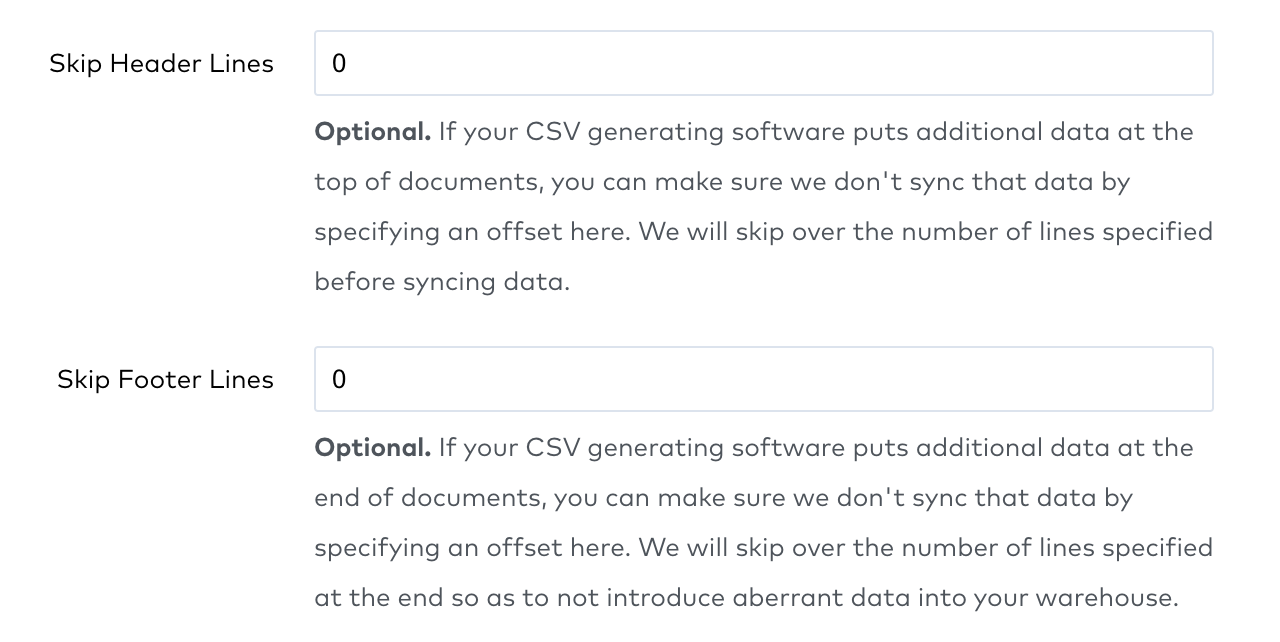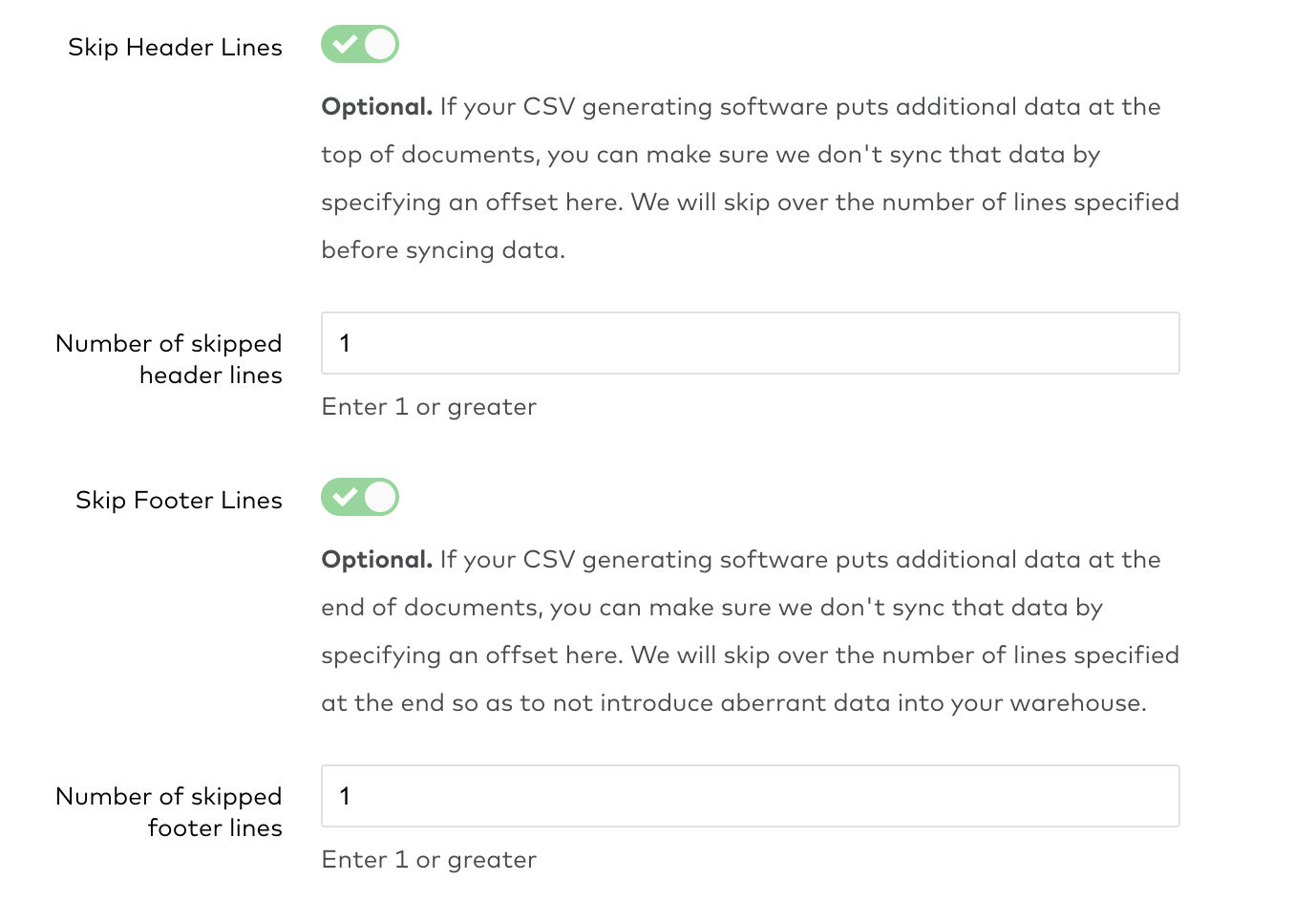Release Notes
February 2026
We now support syncing XLS/XLSX/XLSM files to multiple destination tables and handling file patterns. To support this enhancement, we have made the following changes to the connection setup form:
Moved the Configure files section below the Format section to enable file type selection before configuration.
Moved the following sub-fields from the Format section to the Configure files section of the setup form:
- Manual cell reference
- Spreadsheet to find data to be synced
- Cell reference for syncs
For more information, see our setup instructions. We are gradually rolling out these enhancements to all existing connections.
January 2026
We now record the read_start and read_end events as user-facing logs for all File connectors. For more information, see our Monitor file sync activity documentation.
The Preview Files test now displays the archived files that match your specified archive file pattern, allowing you to review the files that we will process. Previously, it displayed only files matching your specified file pattern.
December 2025
We have added a new feature, Dynamically extract tables. You can now define a single regex pattern with a named capture group (?<table>...) to automatically extract table names from file paths. This feature automatically creates and maps destination tables based on your file naming patterns, eliminating the need for manual intervention.
To support this feature, we have made the following changes to the connection setup form:
- Added a new option, File mapping, that allows you to choose between Define per table and Dynamically extract tables.
- Added a new field, Table extraction pattern, to specify your own regex pattern.
- Added a new button, Preview, to validate the specified regex pattern.
Key benefits include:
- Simplified configuration: Avoids repetitive setup for multiple entities.
- Automatic table creation: Captures new entities as they appear in your source, without additional configuration.
For more information, see our Dynamic Table Mapping tutorial and setup instructions.
We are gradually rolling out this change to all existing connections.
We now support the Source naming feature for the following connectors:
| Application Connectors | Database Connectors | File Connectors | Event Connectors | Function Connectors |
|---|---|---|---|---|
|
November 2025
Azure Blob Storage connector now supports syncing Microsoft Excel spreadsheets. For more information, see our setup instructions.
October 2025
We have added a new authentication method for our Azure Blob Storage connector. You can now use a Microsoft Entra authentication method to connect your Azure Blob Storage with Fivetran. To support these features, we have made the following changes to the connection setup form:
- Added Authentication method field, that allows you to select between Microsoft Entra ID - client credentials grant using client secret and Connection String authentication methods.
- Added Storage account, Tenant ID, Client ID, and Client secret fields, allowing you to provide your own app credentials.
For more information, see our setup instructions and REST API configuration. We are gradually rolling out these changes to all existing connections.
July 2025
We have made the following changes to the connection setup form:
- Added support to configure archive patterns per table. This is useful when an archive folder contains files following different naming patterns, allowing you to route each pattern to a specific destination table based on its pattern.
- Renamed the Archive Folder Pattern field to Archive File Pattern.
For more information, see our setup instructions
June 2025
We are deprecating support for the log file type in file connectors. Use the csv file type instead. Log files will now be processed the same way as CSV files. This change streamlines file type handling without affecting functionality.
April 2025
We now support syncing files to multiple destination tables and handling file patterns. To support these features, we have made the following changes to the connection setup form:
- Added the Files field and sub-fields Table name and File pattern, that enable you to define destination tables and specify the file pattern names.
- Renamed the Destination table field to Table group name to enable unique identification of connections that share the same destination schema name.
Also, we have discontinued the table and pattern configuration parameters for all Azure Blob Storage connections and will delete them by August 31, 2025.
For more information, see our setup instructions and REST API configuration. We are gradually rolling out these enhancements to all existing connections.
We have updated the sync strategy for the following connectors and now preserve the original NUMERIC data types from the source while syncing the Excel files. Previously, we synced the values of the formula cells with NUMERIC data types as FLOAT or DOUBLE.
January 2025
We have renamed the Folder Path field to Base folder path in the following connection setup forms:
This improvement is applicable for new connections created on or after January 2, 2025. We are gradually rolling out this change to all existing connections.
December 2024
We have improved the setup experience for our Azure Blob Storage connector. New connections created on or after December 20, 2024, will have the following changes in the connection setup form:
- Added a new configuration option, Run connection test to perform an intermediate test during configuration
- Added a new configuration option, Preview Files, to perform an intermediate test during configuration
- Added support for displaying fields based on the file type
- Added a new field, Quote character, to use an enclosing character
- Reorganised fields to make the setup form more intuitive
- Removed Infer as an option from the File Type field
- Removed the Enable Advanced Options toggle
- Changed the Null Sequence field to a toggle
- For the Delimiter character(s) field, we now use
,as the default value - For the Line Separator field, we now use
\nas the default value
For more information, see our setup instructions and REST API configuration.
We are gradually rolling out these changes to all existing connections.
November 2024
The Azure Blob Storage connector now supports the Hybrid Deployment model. For more information, see our setup instructions.
September 2024
We now restrict API users from triggering syncs if:
- the
append_file_optionfield is set to theupsert_file_with_primary_keysvalue - primary keys are not defined in the schema configuration
We also restrict the following actions:
- Creating a new connection in an un-paused state via API
- Updating the connection's
pausedfield tofalsevia API request - Forcing the connection sync or re-sync via API request
May 2024
We have added a new configuration option, Primary Key used for file process and load, in the connector setup form to support syncing files with custom primary keys. You can now select the custom primary keys during the connector configuration and use them to update or insert new rows in your destination. We process the most recently modified files to your destination. For more information, see our setup instructions.
September 2023
We now support syncing PGP (Pretty Good Privacy) signed and encrypted files. We have added a new option, Signer's Public Key, to the PGP Encryption Options configuration in the connector setup form. For more information, see our setup instructions.
July 2023
We have changed the default value of the JSON Delivery Mode feature to Packed in the connector setup form. Previously, we used Unpacked as the default value for this feature.
We now support syncing XML files to your destination. We have added a new option, xml, to the File Type drop-down menu of the connector setup form. We load your XML data into the _data column without flattening it. For more information, see our setup instructions.
We now support custom line separators for CSV files. You can specify a custom line separator in the Line Separator field of the connector setup form. For more information, see our setup instructions.
June 2023
We now support multi-character delimiters for CSV files. You can specify a multi-character delimiter in the Delimiter field of the connector setup form. For more information, see our setup instructions.
We now support syncing PGP (Pretty Good Privacy) encrypted files. We have added a new advanced configuration, PGP Encryption Options, to the connector setup form. For more information, see our setup instructions and the REST API configuration parameters.
March 2023
We can now sync packed JSON files from Azure Blob Storage. We have added a new drop-down menu, JSON Delivery Mode, to the connector setup form. The drop-down menu provides you the option to choose how Fivetran should handle your JSON data. For more information, see our setup instructions.
October 2022
You can now connect your Azure Blob Storage container to Fivetran using an SSH tunnel. For more information, see our setup guide.
June 2022
We have redesigned the Skip Header Lines and Skip Footer Lines setup form fields for our Amazon S3, Azure Blob Storage, Dropbox, FTP, Google Cloud Storage, and SFTP file connectors. To set these advanced options, enable them using the toggles and specify the number of skipped lines in the input fields.
Compare how the setup form looked before the change:

and how it looks now:

January 2022
We have added support for Azure Private Link connections to Azure Blob Storage. If you're on a Business Critical plan, you can now opt to use Azure Private Link to connect to Fivetran. In the connector setup form, set the Enable Advanced Options toggle to ON, and then select the Connection Method as Connect via Private Link. For more information, see our setup instructions.
August 2020
We now support syncing headerless delimited format files (CSV, TSV, log) for Azure Blob Storage connections. We will create generic column names for CSV files without a header line. This feature is in beta and available to all connections. See the configuration options in our files documentation for details.
March 2020
Our Azure Blob Storage connector can now sync Parquet files. We support Parquet format 2.4.0. This feature is in Beta.
February 2020
We have improved the way we track which files we have already synced to make sure we only pull new or changed data from the source containers. Previously, we re-synced files that were created at the same time as the last observed cursor position. That ensured that we never missed any files that were created while we were syncing your data. That also meant that we sometimes synced the same files twice. Now, in addition to tracking the timestamp, we also track the names of the files we have already synced. We store up to 1,000 file names. We sync files created at the time of the last observed cursor position only if we don’t have the file in our list of synced files for that timestamp.
May 2018
Azure recommends using Parquet files instead of CSVs, because they don't interpret CSVs reliably. Fivetran will write your data to a Parquet file and upload it to Azure Blob Storage.